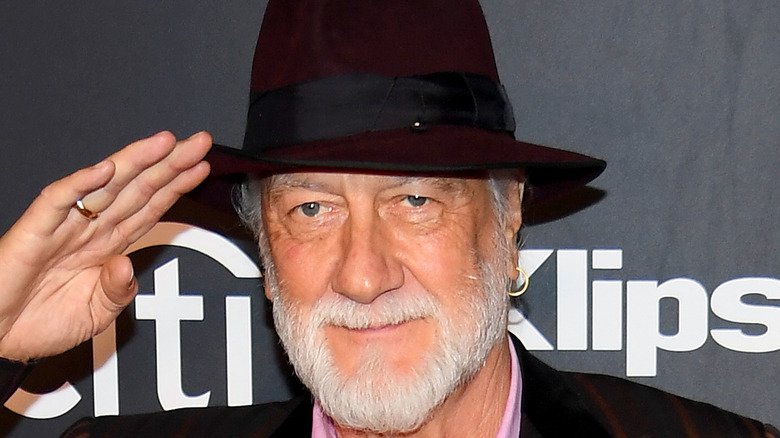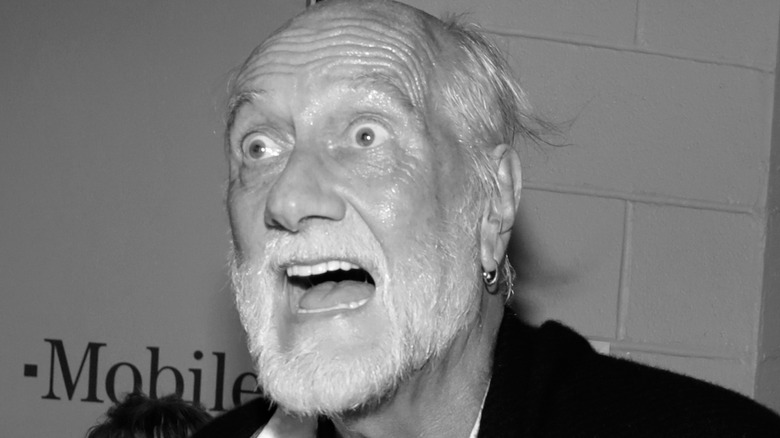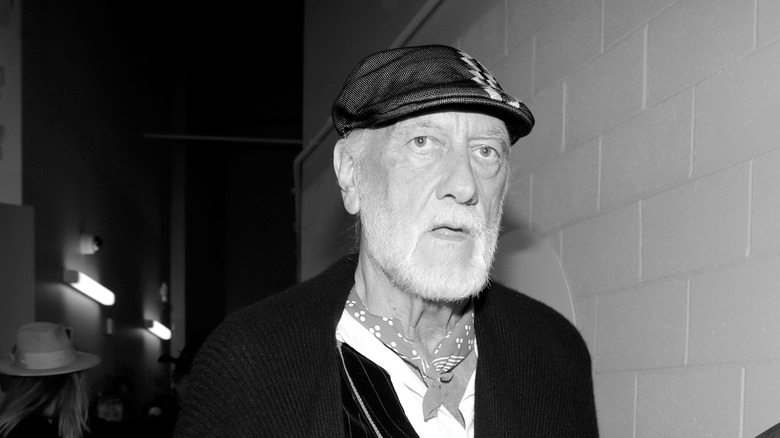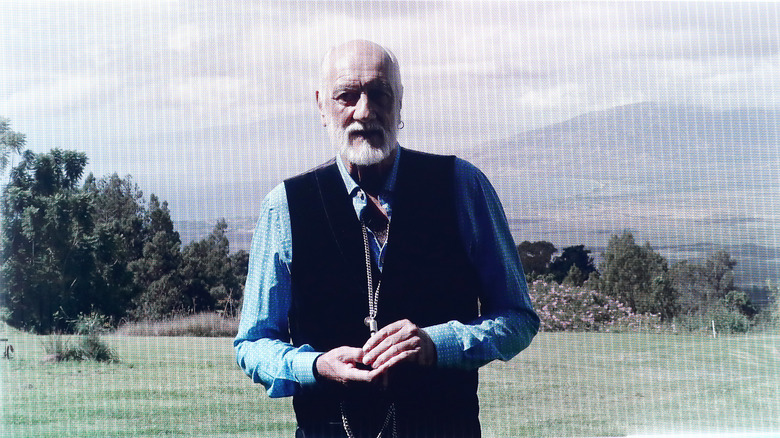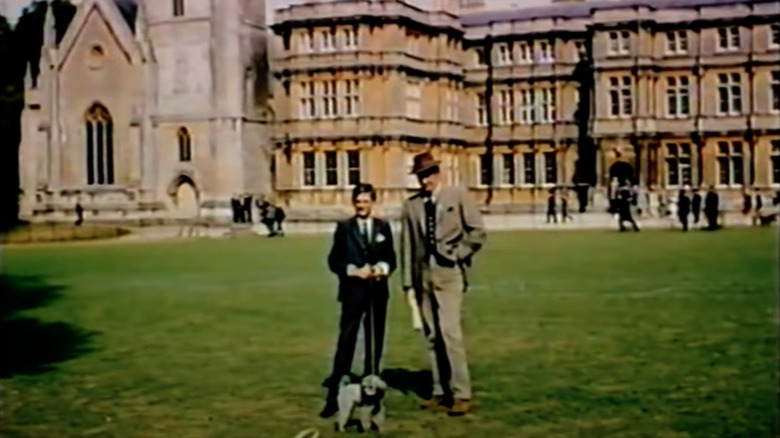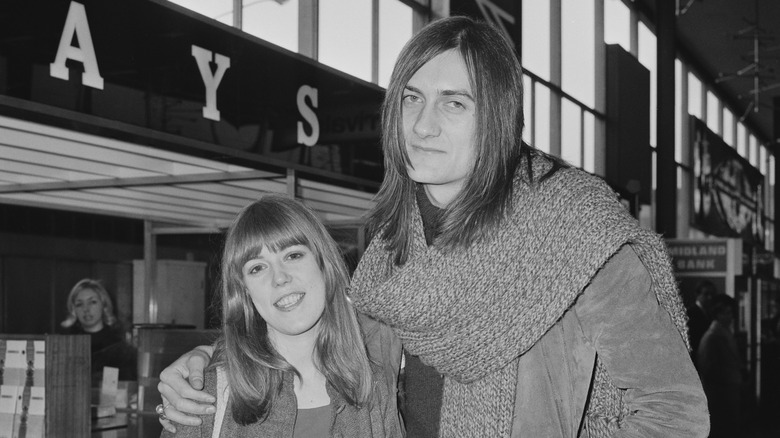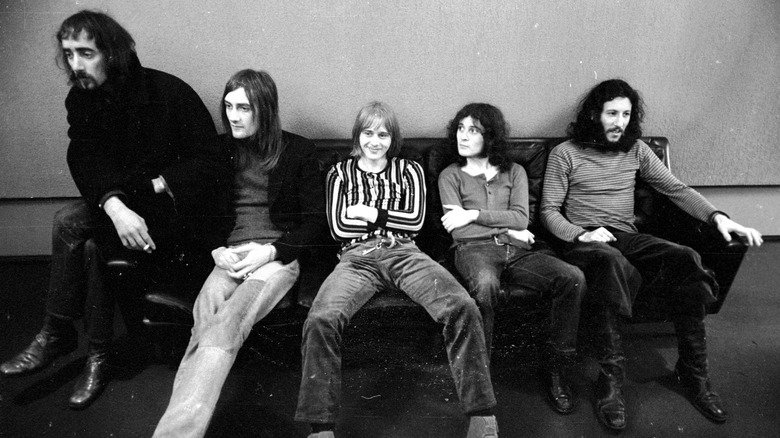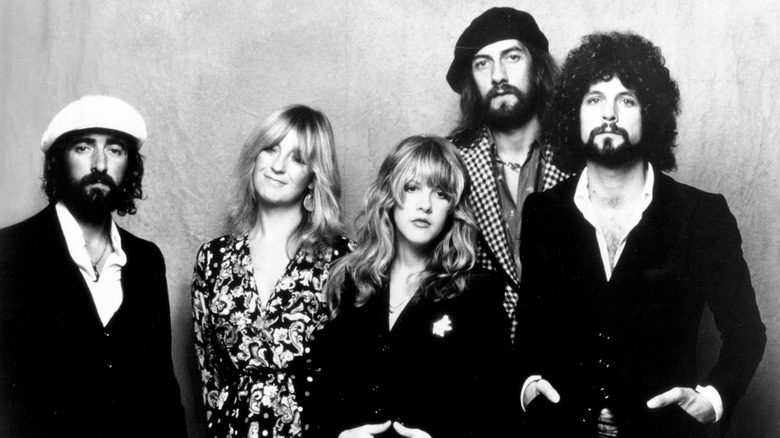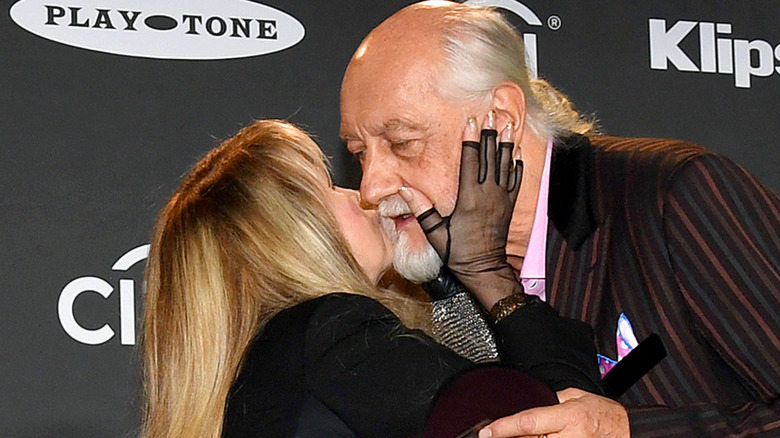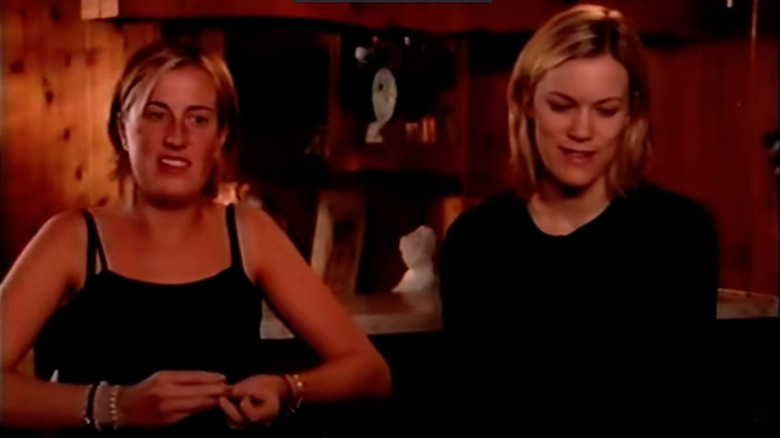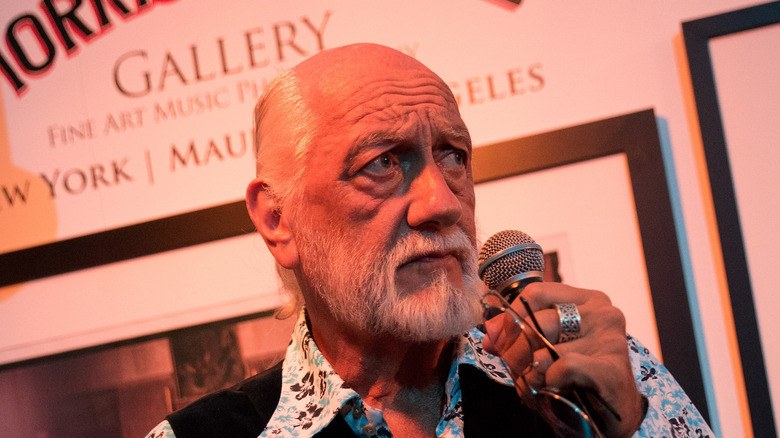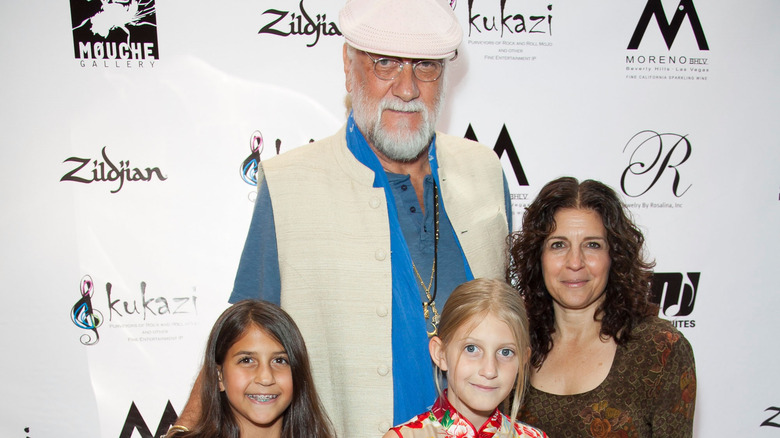The Tragic Real-Life Story Of Mick Fleetwood
You can't say "classic rock" without saying Fleetwood Mac. Throughout the 1970s, they had No. 1 albums, Top 10 singles, and Album of the Year Grammies piling up faster than they could deal with it. And at the center of the band (and in the back of the stage) is a tall man wearing vintage clothes and shiny vests: drummer Mick Fleetwood. As Grammy reports, Fleetwood initially founded the famous band in the United Kingdom in 1967, together with bass player John McVie and guitarist Peter Green. Fleetwood Mac went through several changes of staff until core members Stevie Nicks and Lindsey Buckingham joined the band in 1975, making Fleetwood Mac a British-American rock band. But that was only the start of their drama: Fleetwood Mac was fuelled by breakups, dysfunctional relationships, and drugs. And so was Mick Fleetwood's life.
Fleetwood was often the master of his own demise, but there were several moments when he had an impressive amount of bad luck. However, perhaps the most impressive part of Fleetwood is his resilience, captured in the two words that make the title of his 2014 autobiography: "Play On." This was Fleetwood's mantra throughout the constant personal-professional turmoil, leading him to overcome the dark moments and push the band to ever-greater heights. Here is the tragic (albeit glorious) real-life story of Mick Fleetwood.
He had an itinerant childhood and constantly felt like a stranger
Mick Fleetwood was born in Redruth, Cornwall, on June 24, 1947, as per Britannica, but at a very young age, he had left the country. His father was a Royal Air Force wing commander, so the whole family would move country every two and a half years, as his mother, Bridget Fleetwood remembers in the YouTube Fleetwood Mac 2001 documentary. As a result of this, Mick grew up in England, Egypt, Norway, then England again.
The Fleetwood family was a tight unit: Mick praises them for imbuing him with a fascination for discovering the world (and providing him an excellent model for a long-term relationship). But despite feeling grateful for the experience later in life, young Mick Fleetwood felt like a stranger everywhere he lived. The silver lining? "It was also a great rock-and-roll training camp for me because I became used to travel and being a stranger just passing through" (via "Play On"). Nevertheless, feeling like a stranger and not being able to make long-term friends as a child must have been a fairly daunting experience for Fleetwood.
Mick Fleetwood had a near-death experience as a child
Mick Fleetwood was living in Egypt, as he recalls in his autobiography, "Play On," when he almost drowned. "I'm not sure how or why I got into water too deep for my abilities, but I was pulled out by a man in a flowing blue cloak and when I looked up at him I thought he was a magician."
In a pretty bizarre twist, in July 2008, Mick Fleetwood's daughter, Ruby Fleetwood, was very close to drowning in a Los Angeles pool, as People reports. Apparently, she was doing somersaults in the pool when one of them went wrong, and she swallowed a big quantity of water. Dr. Keith Kimble commented that Ruby was "the victim of an accident that is potentially extremely serious." Ruby is alive and well, but her near-death experience in the water mirrors her father's terrifying moment in Egypt.
He had severe dyslexia
The Fleetwood Mac drummer remembers changing a lot of schools because he was not a very good student — but not the misbehaving kind. Mick Fleetwood suffered from severe dyslexia, but back in the 1950s, teachers didn't recognize the signs: "Back then, particularly in the UK, learning disabilities weren't understood or even accepted, so students like me were simply left behind. My parents only knew I had problems at school," he writes in "Play On."
Nevertheless, Mick managed to turn his dyslexia into something good (inspired by his sister, Susan Fleetwood, who also had dyslexia and made it as an actress in London). His unique drumming style comes precisely from not being "suited to stereotypical 'straight' thought." When fellow drummer Jeff Porcaro asked Mick to reveal the secret behind his last fill in "Go Your Own Way," Mick found himself at a loss. He couldn't logically explain his drumming method, style, or tempo. He says it's just natural, and the fact that he has become one of the greatest rock drummers in musical history is a very hopeful story for any child struggling with learning disabilities.
Boarding schools were a never-ending nightmare
When Mick Fleetwood was around 8 years old, his family returned to England and decided that he and his sisters would be attending boarding school, according to a 2001 documentary on Fleetwood Mac. This meant the Fleetwood children would enter a stable educational system that would see them prepare for college, while the Fleetwood parents continued to travel the world. But boarding school proved to be Fleetwood's worst nightmare. Not only was dyslexia a massive hindrance to his academic results, he developed "Blackboard Syndrome" — as Fleetwood describes it in "Play On" – "a lethal combination of performance anxiety and my dyslexia."
Young Fleetwood would paralyze every time a teacher would ask him to come to the front of the class and answer a question. He was already way taller than anybody else in the room, but his confidence was at an all-time low. To some extent, he knew he had a learning disability, and he simply didn't believe he had the ability to answer things correctly. His 24/7 "fight or flight" state (which Good Therapy explains is a common response to severe performance anxiety) led him to escape several boarding schools. Finally, when he was 15, he made a decision, which he recalls in the 2001 documentary: "I sat absolutely in tears, terribly unhappy and made this whole imagination of where I wanted to be, and I made this complete pledge that I will go to London." His supportive parents bought him a drum kit and sent him to live in his sister's attic.
The first heartbreak
Skip a few years and Mick Fleetwood had become a valuable part of the London music scene — first, by joining John Mayall & the Bluesbreakers in 1967, then, by forming his own band with Peter Green and John "Mac" McVie, as per the Clarion Ledger. As he details in "Play On, Peter Green's "favorite rhythm section" was the combination of Fleetwood and McVie, hence the name.
During these years, Fleetwood fell in love with Jenny Boyd, a model and the sister of Pattie Boyd, who was married to George Harrison at the time (she would go on to marry Eric Clapton afterward), as per Ultimate Classic Rock. After years of very shy courting (as both of them remember in the 2001 Fleetwood Mac documentary), Fleetwood married Jenny Boyd in 1970, and the pair had two daughters. But this was happening at the peak of Fleetwood Mac's success, and the family had zero privacy. They all lived in Kiln House, a giant villa they shared with the whole band and crew. Jenny hated this (via The Guardian): "I wanted to start a family, not a commune."
Furthermore, months would pass where Fleetwood would barely speak to her — he was either on tour or busy recording. Jenny ended up having an affair with the band's guitarist, Bob Weston. According to her, he was the only person who talked to her at Kiln House. Fleetwood found out before they all went on tour together in 1973, but Weston was fired as soon as the tour ended, and Fleetwood and Jenny got divorced soon after.
Mick Fleetwood kept losing his guitarists
Fleetwood Mac had known drama from its very beginning, and a considerable chunk of it was Mick Fleetwood and John McVie losing several guitarists and lead singers. It all started in 1970, with the band's founding member, Peter Green. Less than a year after creating Fleetwood Mac, Green started abusing LSD. It's fairly rare (in comparison to other drugs) that acid has such a drastic negative effect on mental health, but large quantities can induce schizophrenia-like psychosis, and longterm use can exacerbate the disorder (via Black Bear Rehab) — this was the case for Peter Green.
As Louder reports, Green had a three-day LSD binge in early 1970 and emerged convinced that money was the devil, and that Fleetwood Mac's success was a bad omen. He ordered the band to use all their money to end world hunger — when they protested, he quit. What followed, according to Rolling Stone, was a seemingly Sisyphean process of recruiting guitarists that would leave. In 1971, Jeremy Spencer disappeared. Then Bob Weston had to leave after having an affair with Jenny Boyd. Finally, Dave Walker and Bob Welch left. Fleetwood was deeply deflated when he went to the United States talent scouting — but that's also when he found Lindsey Buckingham and Stevie Nicks.
If you or anyone you know is struggling with addiction issues, help is available. Visit the Substance Abuse and Mental Health Services Administration website or contact SAMHSA's National Helpline at 1-800-662-HELP (4357).
Drama in the band
In 1976, Fleetwood Mac had finally reached a stable formation (with its five core members intermittently leaving and returning throughout the five decades). That year, they produced the eponymous No. 1 album, and in 1977, they released "Rumours," which topped the Billboard charts for 31 weeks and won a Grammy. But as Rolling Stone reports, "Rumours" was only the silver lining of the immense turmoil within the band.
Lindsey Buckingham and Stevie Nicks had broken up, and Christine and John McVie were going through a nasty divorce (as Christine was having affairs with crew technicians, as per Far Out Magazine). Mick Fleetwood had remarried Jenny Boyd in 1976 (via the Daily Mail), but their old problems resurfaced. On top of those, Fleetwood started an affair with Nicks. Both Buckingham and Nicks would write songs about their breakup, songs they had to perform even though they often hated it. Nicks was particularly insulted by the "Go Your Own Way" lyrics, as she once told Rolling Stone, "Every time those words would come out onstage, I wanted to go over and kill him. He knew it, so he really pushed my buttons through that." And now Fleetwood was in the middle of all this.
His affair with Stevie Nicks
During their 1977 "Rumours" tour, Mick Fleetwood and Stevie Nicks realized there was more than friendship between them (apparently, their feelings were ignited during Annie Leibovitz's Rolling Stone cover shoot). But Fleetwood was married to Jenny Boyd, having reconciled just the previous year. And Nicks was in a relationship with Don Henley of The Eagles (via Cheatsheet).
As you might have already guessed, their affair was not a success story. It was childish, tumultuous, and fueled by drugs. In fact, Nicks told Oprah (via Huffpost) that the affair might not have happened at all had they not been "completely drunk, messed up and coked out." She went on to explain why the affair was bad: "It was a doomed thing, caused a lot of pain for everybody, led to nothing."
For Fleetwood, his takeaway is more bittersweet, noting in his book (via Cheatsheet) that it was crazy and quite the whirlwhind. Nicks' and Fleetwood's fairly short love story ended the latter's marriage for good and put further strains on Lindsey Buckingham's relationships with the two. In fact, in her book, Boyd recounts Fleetwood telling her that he simply couldn't decide between her and Nicks (via Cosmic Magazine).
For Fleetwood, as per Cheatsheet, the affair will forever be something along the lines of the one that got away, as they never tried to make it work as a couple — a sad touch to Fleetwood's love life.
Drug abuse was the norm
By the mid-1970s, Fleetwood Mac had reached an extreme level of fame and success: They had 14 limos always on call, and Stevie Nicks' hotel rooms had to be painted pink and contain a white piano (via New York Post). Enter coke: the drug that came with VIP partying in the 1970s but also the drug that the band felt they needed in order to cope with an increasingly busy schedule (and its subsequent sleep deprivation). As the New York Post reports, Mick Fleetwood was declared "The King of Toot" backstage, having snorted somewhere between an estimated "seven miles" and $60 million worth of cocaine.
But of course, this behavior was much more self-destructive than it was lavish or extravagant. Fleetwood told NME that there is a two-year gap in his memory due to cocaine, and in the 2001 Fleetwood Mac documentary, he admits his biggest regret: "Part of my crazy behavior was, when I look back on it now, was not being the father that I could have been." Drug use started out as a fun activity to do after gigs. But for many years after, Fleetwood says, "it was no longer a laugh" — he was in a constant bad state, depressed or physically unwell. He would miss birthdays, important events, and apparently, whole years.
Mick Fleetwood's daughters were witnesses to everything
Mick Fleetwood had a tightly knit family unit model growing up, as he reports in his book, "Play On." His mother, Bridget Fleetwood, and her three kids followed father John Fleetwood everywhere he went, even though, at the time, the norm was for the wives of military men to stay home with the children. Perhaps this is why, when he had children of his own, Mick took them with him on all his Fleetwood Mac tours. While this may sound like a lovely family story, it wasn't. Young Amy and Lucy Fleetwood were witnesses to their dad's very worst moments, as per a 2001 Fleetwood Mac documentary.
Lucy remembers that both sisters felt 24/7 concern for their father. They would watch him sleep until late afternoons and be impossible to move (he'd passed out from abusing substances, but the daughters thought he was seriously ill). Amy also says she never got the closure she wanted as a child, as both girls would be ignored by their dad for days on end: "I felt a little like, 'Here I am, I'm right here.'" As Stevie Nicks adds, "We all watched Amy and Lucy grow up without any of us hardly ... you could call in sick to anybody but Fleetwood Mac."
He lost two family members to cancer
In 1978, Mick Fleetwood lost his father to cancer (via a 2001 Fleetwood Mac documentary). Fleetwood had been working hard to offer his parents beautiful retirement years, but he never expected his father to pass away so soon. According to his autobiography, he had hoped to build a house for them on some land in Provence, near a spot his parents had vacationed every summer, so that they could live out the rest of their years in a place they loved. Sadly, Mick was on tour in the states when his father died and was unable to say goodbye.
Then, in 1995, tragedy struck again when Mick Fleetwood lost his sister, Susan Fleetwood, to breast cancer. She had been diagnosed a decade earlier but had never abandoned her acting career while undergoing treatment, as Variety reports.
Meeting his third wife changed his life (but they, too, broke up)
In 1989, Mick Fleetwood met his third wife, Lynn Frankel Fleetwood (as the 2001 Fleetwood Mac documentary reports) — but they wouldn't get married until 1995 when Lynn decided Mick was well enough to spend his life with her. Indeed, Lynn was the catalyst for Mick quitting his alcohol and substance abuse. Mick remembers one particularly important day, when he was barely recovering from a party (on a trip to Maui where he and Lynn were supposed to enjoy sober time together), and his wife announced she would be going home. Mick had a look in the mirror and saw a "sweaty, greasy blancmange" that shook him to his core — he went to bed, woke up, and decided to get sober.
Both Mick and his daughter, Amy Fleetwod, praise Lynn for being the catalyst for change. As Star (via This is Surrey Today) reports, Mick and Lynn Fleetwood went on to have twin daughters, and everything seemed peachy for a good while. But in 2013, the couple announced their split (via Ultimate Classic Rock), citing irreconcilable differences.
